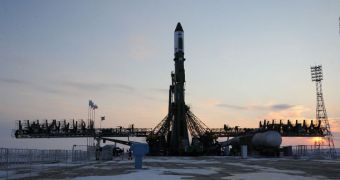According to the manager of the International Space Station (ISS) program at NASA, Mike Suffredini, the launch of the Russian-built Soyuz TMA-04M spacecraft has been delayed by at least a month. He told reporters on February 2 that liftoff is now scheduled for no earlier than May 15.
The space capsule, built for and operated by the Russian Federal Space Agency (RosCosmos), is currently the only manned spacecraft on the planet that is capable of taking astronaut to low-Earth orbit (LEO) and the ISS, Space reports.
Therefore, it's easy to understand how any type of issue affecting it is taken extremely serious. Unfortunately, an error occurred during a series of tests conducted a few days ago, at the spacecraft's launch site. The Soyuz usually launches from the Baikonur Cosmodrome, in Kazakhstan.
As Russian engineers were conducting a standard pressure test on the TMA-04M capsule, they discovered a series of anomalous readings, which require further investigations. RosCosmos and NASA officials decided to delay the launch in order to ensure the success of the mission.
Over the past 6 months or so, RosCosmos experienced a series of unusual, uncharacteristic failures that made some question it. The agency has an excellent track record for both manned and unmanned space launches, better than any other agency's.
But last year saw it losing one of the Progress resupply spacecraft it uses to ferry cargo to the ISS, as well as a couple of satellites and the Phobos-Grunt sample-return mission, which was headed for Mars.
Under these circumstances, it stands to reason that RosCosmos is unwilling to let any type of error slide, especially when manned space launches are involved. Originally, the Soyuz TMA-04M capsule was supposed to launch on March 29.
“This particular event is very unfortunate, but you know this is a complicated business and things happen. To me this is not indicative of some overarching problem at the Energia corporation. I have every confidence that they'll figure out the cause of this and rectify it for the future,” Suffredini told the media.
“We probably won't see the next Soyuz until the mid-July timeframe. There'll be about a two-week impact as we go into the fall and winter. Although there is a schedule impact, from a performance standpoint there's really no impact” to operations aboard the ISS,” he concluded.

 14 DAY TRIAL //
14 DAY TRIAL //